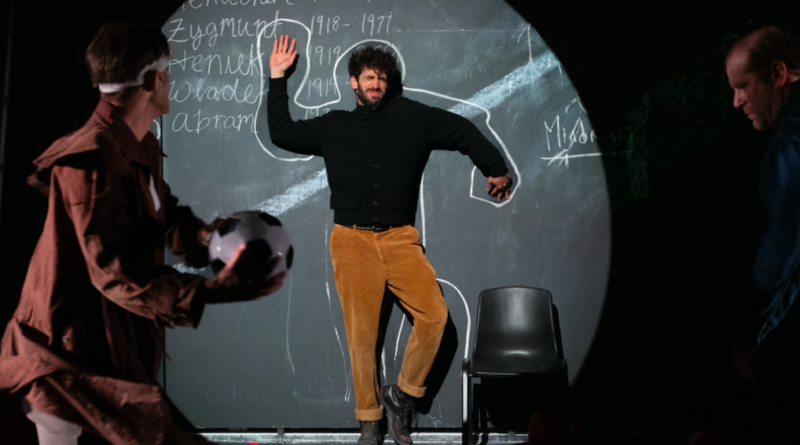INTERVIEW: Igor Golyak sets up a topical theatrical residency in NYC
Photo: Our Class features Stephen Ochsner in the cast. Performances continue until Nov. 3 at the Classic Stage Company. Photo courtesy of Pavel Antonov / Provided by KSA PR with permission.
Igor Golyak, artistic director of the Arlekin Players Theatre in Boston, has been having a busy 2024 in New York City. His production of Our Class had an acclaimed run earlier this year as part of the Under the Radar Festival, and now it’s back off-Broadway, this time at the Classics Stage Company in Downtown Manhattan. The show follows 10 classmates, five Jewish and five Roman Catholic, as they navigate difficult issues as they grow older in Poland, according to press notes. The return engagement is running now through Nov. 3.
Golyak is not finished yet. After Our Class completes its run, the director will mount a new production of The Merchant of Venice, the controversial play by William Shakespeare. Most of the same cast from Our Class will be part of the Bard’s play as well. Performances for Merchant run Nov. 22 to Dec. 22. Both shows, presented by the MART Foundation, focus on the theme of antisemitism and the horrors that can come from prejudice.
Recently Golyak exchanged emails with Hollywood Soapbox to talk about the opportunities and challenges of staging these two works, and what it’s been like to work with his cast, including Richard Topol. Questions and answers have been slightly edited for style.
How did these double productions come about at Classic Stage Company? Did you pitch them, or did they come to you?
We did Our Class at BAM [Brooklyn Academy of Music] in January/February. After those performances, people wouldn’t leave the theater — the play really struck a nerve, and it was like people wanted to just stay together. We sold out, extended, sold out again, and we felt we had to transfer it to Manhattan. My friend and colleague, the incredible Carey Perloff, suggested we talk to to Classic Stage. I had been thinking about doing The Merchant of Venice in New York as well, and my producing partner Sara suggested we think about doing both plays at once, one following the other, both at Classic Stage. A 1-2 punch. For me, the two plays relate to one another, and I was interested in creating a kind of diptych with the two pieces. This project ignited, had so much energy, and we put together this Arlekin Players residency with the team at Classic Stage — two plays, back-to-back, centering antisemitism, and with the same cast in the same theater. The project has taken on a life of its own, and we can’t wait for people to come see Our Class and then Merchant with this stellar group of actors in this beautiful space.
Will Our Class be exactly the same as the BAM run, or will you make some changes?
Theater is alive, so we are making some updates and changes, especially working in a new space that offers different possibilities and a different relationship with the audience. Come see it and find out.
When you first read Our Class, what did you respond to? What did you like about the text?
It’s beautifully written by Tadeusz Slobodzianek — a masterpiece. But what drew me to it were the characters — 10 of them, children, who we relate to, who we like. We go with them to the brink when they have to make life and death decisions. We see ourselves in it and ask, “What would I do? What will I do?”
Some believe The Merchant of Venice should not be staged anymore because of its stereotypes. What’s your take on this story and the character of Shylock?
When I started researching for Merchant, I discovered that until the 19th century, productions of Merchant were pretty straightforward. It was a story of good and evil. Shylock was the antagonist, the bad guy. He was punished. There was a wedding and happy ending. The end. But things change over time, contexts change, people start to question things, and so at the end of the19th century, we start to see Shylocks portrayed with more notes of empathy, more humanity … until the famous antisemitic productions of Merchant in Nazi Germany. These two ways of approaching this play co-exist now, although I find the latter to be more true to the playwright.
How has the experience been working with Richard Topol?
Rich is extraordinary. Working with him is a gift and an incredible experience. He’s fun and alive, energetic and so curious, inventive and up for anything. He’s a leader in the room. He’s also a deep well, a serious thinker and artist. His Abram in Our Class and then his Shylock in Merchant, especially one following the other, are going to be something special for all of us to witness.
Would you say the next few months are the most important months ever for Arlekin Players Theatre?
I don’t know if I would say they are the most important months ever. They are very important because we have a chance to produce these stunning pieces and have so many new people see them, and because these pieces are so needed, so timely right now. But as an artist, I guess every project I do is the most important one ever, at that time, in that moment.
By John Soltes / Publisher / John@HollywoodSoapbox.com
Our Class and The Merchant of Venice will play as part of the Arlekin in Residence series at Classic Stage Company in New York City. Click here for more information and tickets.

